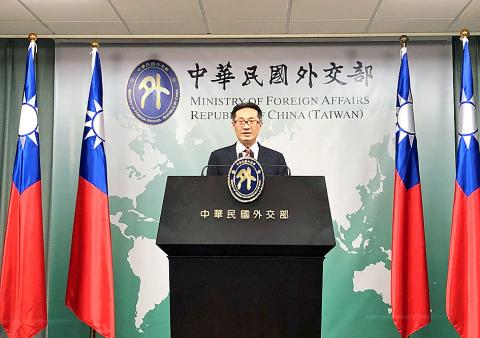Saturday’s presidential and legislative elections are drawing worldwide attention, as several foreign delegations, as well as more than 210 journalists, are to observe the voting results, the Ministry of Foreign Affairs said yesterday.
Three delegations from Europe — a four-member legislative delegation from Sweden, a five-member legislative delegation from Ireland and a five-member delegation of academics from Denmark — are to observe the elections, Department of European Affairs Deputy Director-General Ko Liang-jui (柯良叡) told a news briefing in Taipei.
They are to visit the Central Election Commission’s poll center and local ballot stations, he said, adding that foreign parliamentary groups had previously observed elections in Taiwan.

Photo: CNA
More than 210 international journalists — 60 originally stationed in Taiwan and more than 150 flying in from other nations — representing 100 media agencies have applied for permits to cover the elections, ministry spokeswoman Joanne Ou (歐江安) said.
Minister of Foreign Affairs Joseph Wu (吳釗燮) is to brief them on background information related to Taiwan’s democracy and election system, Ou said, adding that they are traveling to the nation at their own expense.
There would also be several groups from the US and other countries, she said, but added that the ministry could not provide a list at the moment.
Separately yesterday, US Senator Rick Scott said on Twitter that “Taiwan’s election is vital to the continued fight for human rights & freedom in the region.”
“Allowing Communist China’s influence to spread will only open more doors for oppression. We must stand with our brothers & sisters in #HongKong & #Taiwan,” he wrote.
In related news, Ko is later this month to succeed Representative to the Czech Republic Wang Chung-yi (汪忠一) as Taiwan’s envoy to the European nation.
Asked if Czech Senate President Jaroslav Kubera might change his plan to visit Taiwan after the elections due to Beijing’s influence, Ko said that Kubera has repeatedly expressed his plan to visit Taiwan and that the ministry welcomes his visit.
Prague has placed a great emphasis on attracting foreign investment, and Taiwan and the Czech Republic have many collaborative opportunities in industry, culture and technology, Ko said, adding that he hopes to make Taiwan better-known among the Czech public.

Taiwan is projected to lose a working-age population of about 6.67 million people in two waves of retirement in the coming years, as the nation confronts accelerating demographic decline and a shortage of younger workers to take their place, the Ministry of the Interior said. Taiwan experienced its largest baby boom between 1958 and 1966, when the population grew by 3.78 million, followed by a second surge of 2.89 million between 1976 and 1982, ministry data showed. In 2023, the first of those baby boom generations — those born in the late 1950s and early 1960s — began to enter retirement, triggering

ECONOMIC BOOST: Should the more than 23 million people eligible for the NT$10,000 handouts spend them the same way as in 2023, GDP could rise 0.5 percent, an official said Universal cash handouts of NT$10,000 (US$330) are to be disbursed late next month at the earliest — including to permanent residents and foreign residents married to Taiwanese — pending legislative approval, the Ministry of Finance said yesterday. The Executive Yuan yesterday approved the Special Act for Strengthening Economic, Social and National Security Resilience in Response to International Circumstances (因應國際情勢強化經濟社會及民生國安韌性特別條例). The NT$550 billion special budget includes NT$236 billion for the cash handouts, plus an additional NT$20 billion set aside as reserve funds, expected to be used to support industries. Handouts might begin one month after the bill is promulgated and would be completed within

NO CHANGE: The TRA makes clear that the US does not consider the status of Taiwan to have been determined by WWII-era documents, a former AIT deputy director said The American Institute in Taiwan’s (AIT) comments that World War-II era documents do not determine Taiwan’s political status accurately conveyed the US’ stance, the US Department of State said. An AIT spokesperson on Saturday said that a Chinese official mischaracterized World War II-era documents as stating that Taiwan was ceded to the China. The remarks from the US’ de facto embassy in Taiwan drew criticism from the Ma Ying-jeou Foundation, whose director said the comments put Taiwan in danger. The Chinese-language United Daily News yesterday reported that a US State Department spokesperson confirmed the AIT’s position. They added that the US would continue to

IMPORTANT BACKER: China seeks to expel US influence from the Indo-Pacific region and supplant Washington as the global leader, MAC Minister Chiu Chui-cheng said China is preparing for war to seize Taiwan, Mainland Affairs Council (MAC) Minister Chiu Chui-cheng (邱垂正) said in Washington on Friday, warning that Taiwan’s fall would trigger a regional “domino effect” endangering US security. In a speech titled “Maintaining the Peaceful and Stable Status Quo Across the Taiwan Strait is in Line with the Shared Interests of Taiwan and the United States,” Chiu said Taiwan’s strategic importance is “closely tied” to US interests. Geopolitically, Taiwan sits in a “core position” in the first island chain — an arc stretching from Japan, through Taiwan and the Philippines, to Borneo, which is shared by